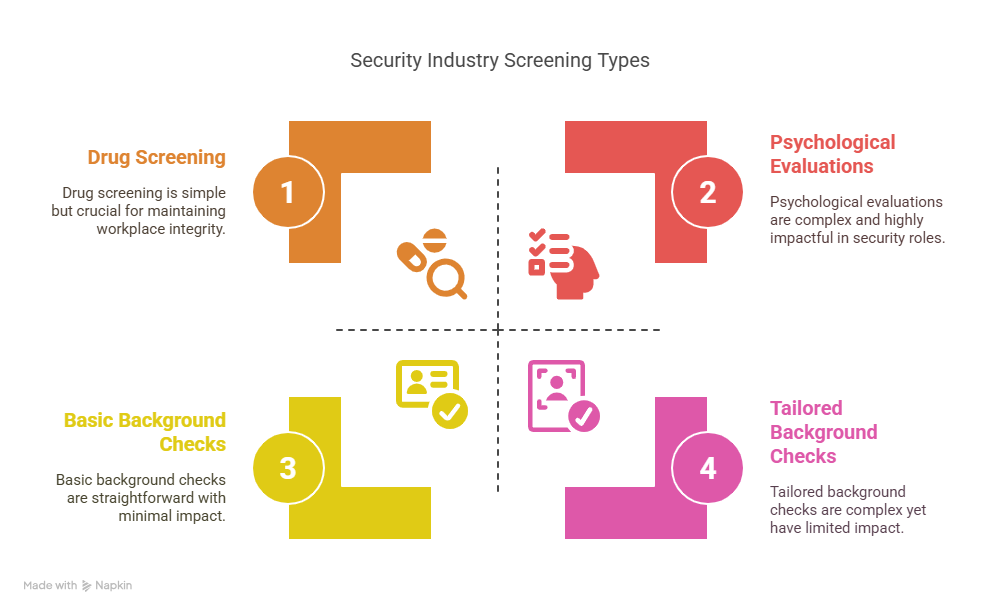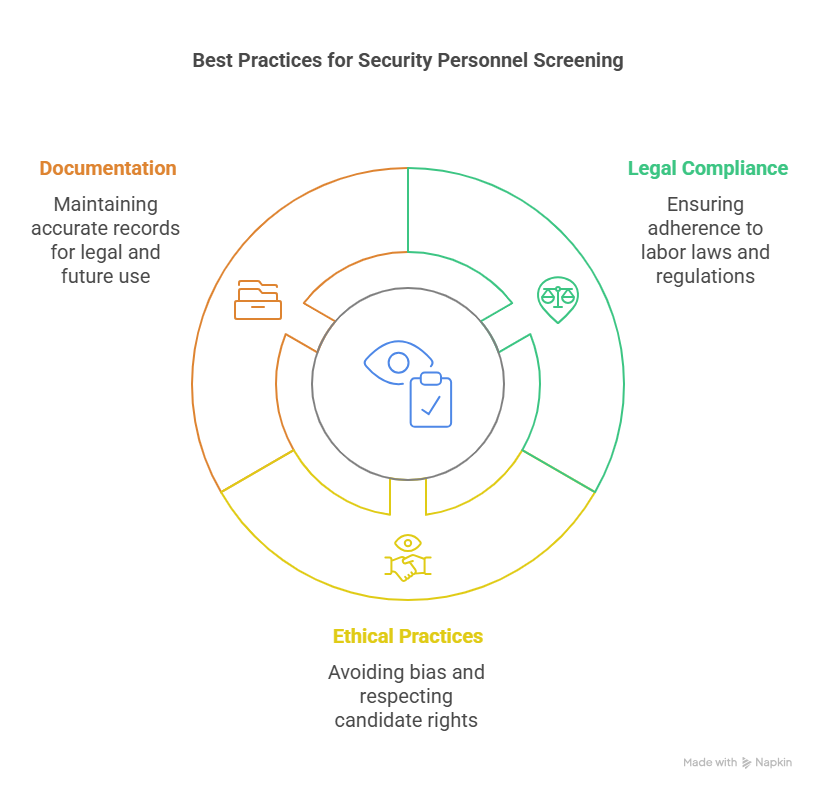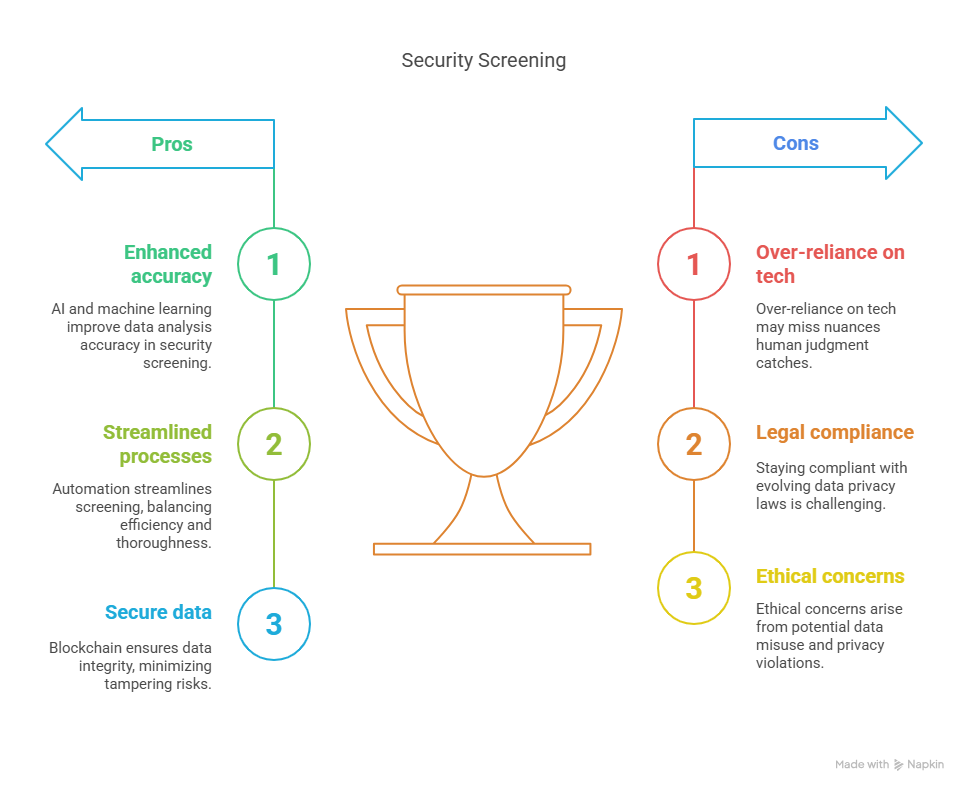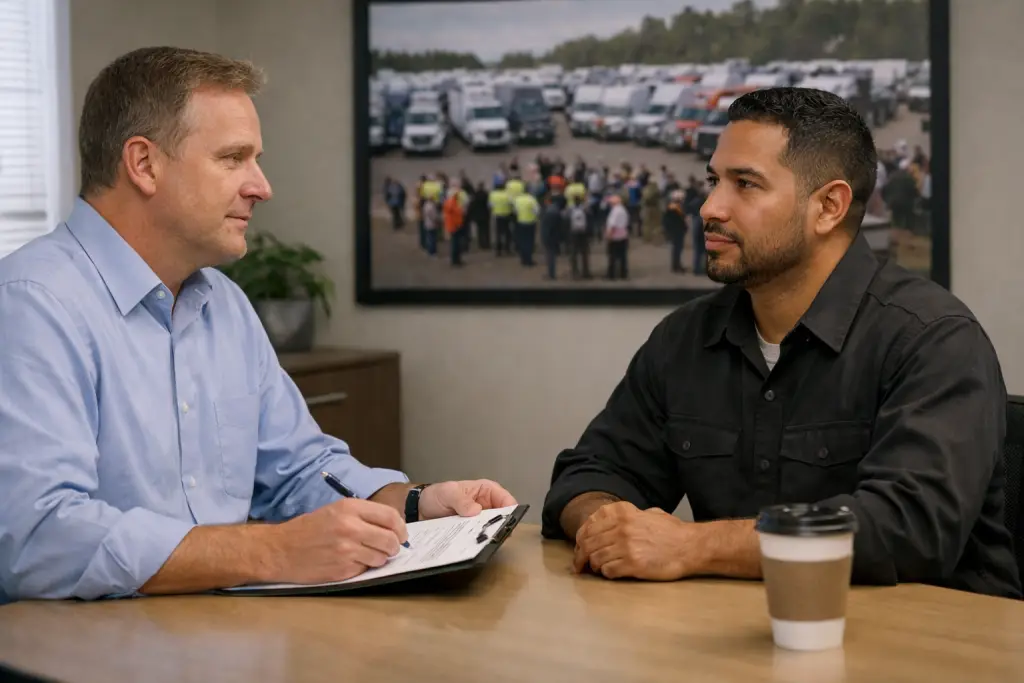In an age where security is paramount, the hiring processes within the security industry have evolved to ensure that only the most reliable personnel are employed. Given their critical roles, security personnel are subject to rigorous screening practices that help maintain safety and trust. Understanding these practices is crucial whether you're a business owner, HR professional, recruiter, or job seeker.
Key Takeaways
- Comprehensive screening practices are crucial in the security industry to ensure trustworthy and reliable personnel.
- Key screenings include background checks, drug screenings, and psychological evaluations to maintain safety and standards.
- Best practices for employers encompass developing clear screening policies, adhering to legal and ethical considerations, and maintaining meticulous documentation.
- Job seekers should understand the multi-layered screening process, their legal rights, and how to proactively address any potential red flags.
- Future trends in security screening involve leveraging technological advancements like AI and blockchain, balancing efficiency with thoroughness, and adapting to an evolving legal landscape.
Introduction
In today's world, security is more than just a buzzword—it's necessary. With threats evolving and becoming increasingly sophisticated, the security industry must stay ahead by employing personnel who are not only skilled but also trustworthy and reliable. This is where robust screening practices come into play, ensuring that only the most qualified individuals are entrusted with critical security roles.
A significant statistic in employment background checks is that 95% of employers conduct some form of background screening. This high percentage underscores the importance that companies place on ensuring the safety and integrity of their workforce. Background checks are critical for protecting employees, customers, and company reputation, as well as for complying with legal and regulatory requirements
This article explores the multifaceted screening processes within the security industry. We'll discuss why these practices are vital, the various types of screenings employed, and the steps involved in the screening process. Additionally, we'll explore best practices for employers, considerations for job seekers, and the future of security screening. Whether you're a business owner, HR professional, recruiter, or job seeker, understanding these screening practices is essential for maintaining a safe and secure environment.

The Importance of Screening in the Security Industry
Trust and safety aren’t just buzzwords in the security industry—they’re the foundation on which every credible firm builds its reputation. The roles within this sector often involve safeguarding people, property, and sensitive information. Therefore, the stakes are incredibly high. You can’t afford to have a weak link, and that’s why comprehensive screening is a non-negotiable element.
When you hire a security professional, you ask someone to hold a position of trust. They must be reliable enough to handle stressful and high-stakes situations without flinching. Rigorous screening practices make this possible. By delving into a candidate’s background, employers can assess their history and judge whether they can be trusted with critical responsibilities.
Reputation management is another critical reason for thorough screening. One blunder can tarnish a company's name for years. An employee with a shady past or failing to perform can have severe consequences, from lost clients to legal liabilities. And let’s not forget that prospective clients often scrutinize security firms' reputations before committing. A solid screening process assures them that you're hiring vetted and reliable personnel, thus safeguarding your brand’s integrity.
Speaking of legal liabilities, adhering to legal compliance is not optional. Regulations, such as those laid out by the EEOC, mandate that screening processes must be fair, non-discriminatory, and meticulously documented. Non-compliance could mean hefty fines and lawsuits, adding another layer of reason to implement robust screening mechanisms.
In summary, the importance of screening in the security industry can’t be overstated. It’s about ensuring trust and safety, protecting your company’s reputation, and staying within legal boundaries. For all these reasons, anyone involved in hiring for this industry should prioritize a comprehensive screening process.
EXPERT INSIGHT: As Kevin Plank said, Trust is earned in drops and lost in buckets. In security, that saying is accurate—because each interviewing choice is by nature one about trust. As an HR professional, I've come to recognize that screening is not a checkbox—it's an act of stewardship. You're not reviewing resumes—you're protecting lives, reputations, and communities. I've seen firsthand how diligent screening can make all the difference between chaos and order, between safety and scandal. In all our vigilance, though, we have to approach with empathy—because behind each background check is someone working to earn that trust, drop by drop. - Charm Paz, CHRP
Types of Security Industry Screenings
Regarding hiring in the security industry, screening processes are not just recommended but a cornerstone of operational integrity. Let's break down the primary types of screenings that security companies employ to ensure that they hire only the best. These screenings are reassuring but intimidating, especially for those who feel that their entire background is being revealed. It is an approach that is more than checking boxes—it hangs on trust, character, and morality that is aligned with assuming responsible roles. For businesses, every point of decision making throughout screening is weighed, defining not just an employee group, but integrity and security in settings that they maintain.
Background Checks
A robust background check forms the foundation of any screening process in the security industry. These checks typically delve into an individual's criminal history, employment history, and educational background. They are not one-size-fits-all and can be tailored to meet specific needs.
For instance, criminal history checks focus on uncovering any past criminal activity that could disqualify a candidate from a sensitive security role. Employment verification is crucial to validating a candidate's work history and ensuring that their resume accurately reflects their professional experience. Similarly, education checks confirm that the credentials listed in the resume are legitimate.
For more insights into common background check questions and practices, refer to internal resources like Most Common Background Check Questions.
Drug Screening
Maintaining a drug-free workplace is critical in the security sector, where impaired judgment can have severe consequences. Drug screenings are used to detect illicit substances in an applicant's system and typically include tests for marijuana, cocaine, opiates, amphetamines, and PCP. These tests can be conducted through various means, including urine, blood, or hair samples. Regular drug tests help ensure that security personnel are sober and fit for duty at all times.
Psychological Evaluations
Given the high-stress environments that security personnel often work in, psychological evaluations are an integral part of the screening process. These assessments gauge a candidate's mental stability, stress tolerance, and overall psychological fitness, ensuring they can handle the pressures and responsibilities that come with the job. From structured interviews to standardized tests, various tools are used to evaluate the psychological suitability of candidates for high-stakes security roles.
In summary, each type of screening—be it background checks, drug screenings, or psychological evaluations—plays a vital role in ensuring that only the most capable individuals are entrusted with security responsibilities. These rigorous processes help maintain safety, trust, and reliability within the industry.

Steps in the Screening Process
Initial Application Screening
The journey begins with the initial application screening, where resumes and job applications are subject to a thorough review. This step isn't just about skimming through qualifications—it's where the wheat is separated from the chaff. Employers look for relevant experience, necessary certifications, and any red flags that might suggest a candidate isn't suitable for the role. It's a critical first filter that helps ensure only the most promising candidates move forward.
Interview Assessments
After clearing the application stage, candidates undergo interview assessments. These can take multiple forms, including phone interviews, face-to-face meetings, and even panel interviews. The goal here is to evaluate not just the candidate's experience and skills but also their demeanor, reliability, and trustworthiness. Security roles often require individuals who can remain calm under pressure; interviews are designed to test these traits.
Detailed Background Checks
Background checks delve deeper than the surface-level information. Typically, employers investigate a candidate’s criminal history, verify past employment, and confirm educational credentials. This phase is crucial for uncovering any potential risks associated with hiring a candidate. Employers often rely on professional background check services to ensure the accuracy and thoroughness of this investigation.
Drug and Alcohol Testing
Drug and alcohol tests form another pivotal step in the screening process. These tests are conducted to ensure the candidate maintains a drug-free lifestyle, which is vital in roles that require high levels of alertness and responsibility. Methods vary but often include urine, hair, or blood tests. Timing is also strategic—testing can occur during pre-employment and at random intervals throughout employment.
Psychological and Physical Assessments
Candidates for security roles must be both mentally and physically fit. Psychological evaluations typically involve standardized tests that measure a candidate's ability to handle stress, their emotional stability, and their suitability for high-stakes environments. Physical assessments, on the other hand, evaluate physical fitness and ensure the candidate can meet the physical demands of the job, whether that's standing for long periods or responding to emergencies.
Each step in the screening process serves as a checkpoint, designed to filter out unsuitable candidates and ensure only the most reliable individuals are entrusted with the security and safety responsibilities.
Best Practices for Employers
When it comes to employing security personnel, having a clear and consistent screening policy is non-negotiable. It's not just about weeding out unqualified candidates; it's about creating a solid framework that ensures only the most reliable and qualified individuals make the cut.
Developing Clear Screening Policies:
Clarity is your best friend. Start by establishing well-defined criteria for each role. Whether it's the prior work experience required, the types of background checks to be conducted, or the specific attributes sought after in psychological evaluations, having a consistent policy helps eliminate ambiguity and ensures a fair process. For further insights, tapping into detailed resources like GCheck Blog can provide additional guidance on formulating robust policies.
Legal and Ethical Considerations:
Staying compliant with legal requirements isn't optional – it's mandatory. Adherence to regulations laid out by entities like the Department of Labor ensures you stay on the right side of the law. But compliance goes beyond the legalese. It’s about fostering ethical practices that respect the rights and dignity of all candidates. Avoid biased screening processes that could inadvertently lead to discrimination.
Documentation and Record-Keeping:
Accurate documentation isn't just a box to tick; it’s the backbone of a trustworthy screening process. Maintain comprehensive records at every step – from initial applications to final hiring decisions. Good record-keeping aids in legal compliance helps resolve disputes, and provides invaluable references for future hiring cycles. If you ever need to revisit a decision or defend it, having well-organized documentation will make the task much simpler and defensible.

Considerations for Job Seekers
Navigating the screening process can feel overwhelming for job seekers, but being well-prepared turns this crucial step into just another box to tick. Here's what you need to know:
Understanding the Screening Process
First things first—it's essential to understand what you're up against. Security jobs often go beyond the basic background check, incorporating multiple layers of screening:
- Background Check: This typically includes criminal history, employment verification, and education checks. Knowing your record is crucial. If something unexpected comes up, be ready with an explanation.
- Drug and Alcohol Testing: Many security roles mandate a drug-free workplace. Tests can range from urine to hair follicle screenings. Familiarize yourself with the different types so you aren't blindsided.
- Psychological Evaluations: Stressful situations come with the territory, and employers need to ensure you're mentally fit. These evaluations measure your psychological resilience and ability to deal with high-pressure environments.
Legal Rights and Privacy
During the screening process, it's natural to feel your privacy is being invaded. However, you do have legal rights:
- Consent: Employers must obtain your consent before conducting most screenings. Make sure you read any forms carefully to understand what you're agreeing to.
- Accuracy: You're entitled to know the results of your screenings. If something is incorrect, you have the right to dispute it, potentially rectifying any errors.
- Confidentiality: Your information should be kept confidential and only used for hiring decisions. If you suspect misuse, there are legal avenues for recourse.
Addressing Red Flags
Got a few skeletons in the closet? Don't panic. Here's how to address them proactively:
- Be Honest: Transparency is your best policy. If you have a criminal record or past substance issues, be upfront. Employers appreciate honesty and maturity in addressing your history.
- Explain Changes: Emphasize how you've changed and what steps you've taken to ensure non-recurrence. Whether it's completing a rehabilitation program or acquiring certificates, demonstrating your commitment to personal growth can go a long way.
- Provide References: Trustworthy references who can vouch for your character and recent behavior can tilt the scales in your favor.
Understanding these key areas can transform a nerve-wracking process into a manageable one. Equip yourself with knowledge, prepare well, and you'll be on your way to landing that security role.
Challenges and Future Trends in Security Screening
Technological Advances
Incorporating technological advancements into screening practices is revolutionizing the security industry. AI and machine learning algorithms are now used to analyze vast amounts of data more efficiently and accurately than traditional methods. These technologies can identify patterns and red flags that might elude human reviewers, helping to ensure thorough background checks and risk assessments. The use of blockchain for secure and immutable record-keeping is another promising development, which can greatly minimize the risk of data tampering and ensure the integrity of screening data.
Balancing Efficiency and Thoroughness
One of the main challenges in security screening is achieving a balance between efficiency and thoroughness. Employers need to conduct comprehensive screenings without causing unnecessary delays in the hiring process. Streamlining procedures through automation and improved data-sharing protocols can help expedite the process while maintaining high standards. However, over-reliance on automation may overlook the nuances that the human touch can catch, so a balanced approach that leverages both technological tools and human judgment is essential.
Evolving Legal Landscape
The legal framework governing security screenings is constantly evolving, influenced by changes in data privacy regulations and anti-discrimination laws. Staying compliant with numerous regulatory requirements, such as the Fair Credit Reporting Act (FCRA) and the General Data Protection Regulation (GDPR), poses a challenge. Employers must stay updated on legislative changes and ensure their screening practices are adaptable. Potential future legal changes may include stricter data protection measures and clearer guidelines on the permissible scope of background checks, impacting the industry’s approach to screening.
By keeping abreast of these challenges and trends, stakeholders in the security industry can better navigate the complexities of the screening process, ensuring the selection of trustworthy and capable personnel. Embracing innovation while adhering to legal and ethical standards is crucial for maintaining the integrity and reliability of security operations.

Conclusion
Comprehensive screening practices hold immense importance in the security industry, acting as the foundational pillar in building a reliable and trustworthy workforce. Rigorous checks, whether they are background investigations, drug tests, or psychological evaluations, ensure that security personnel are fit for their roles and can be trusted to uphold safety standards.
In sum, the evolving practices in security screenings are indispensable to both individual job seekers and organizations. For businesses, it means safeguarding their reputation and adhering to legal requirements. For candidates, it is about navigating the process with transparency and preparedness, understanding their rights, and showcasing their reliability.
Ultimately, stakeholders at all levels should remain informed about best practices, ever-changing legal landscapes, and future technological advancements. Staying proactive in these areas not only strengthens security operations but also fosters a culture of trust and accountability.

GCheck Editorial Team
Meet the GCheck Editorial Team, your trusted source for insightful and up-to-date information in the world of employment background checks. Committed to delivering the latest trends, best practices, and industry insights, our team is dedicated to keeping you informed.
With a passion for ensuring accuracy, compliance, and efficiency in background screening, we are your go-to experts in the field. Stay tuned for our comprehensive articles, guides, and analysis, designed to empower businesses and individuals with the knowledge they need to make informed decisions.
At GCheck, we're here to guide you through the complexities of background checks, every step of the way.






